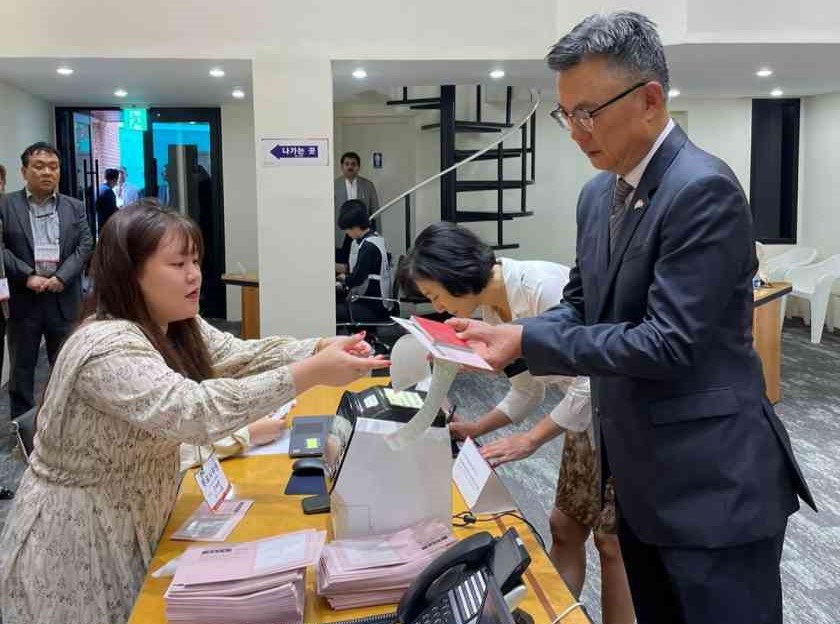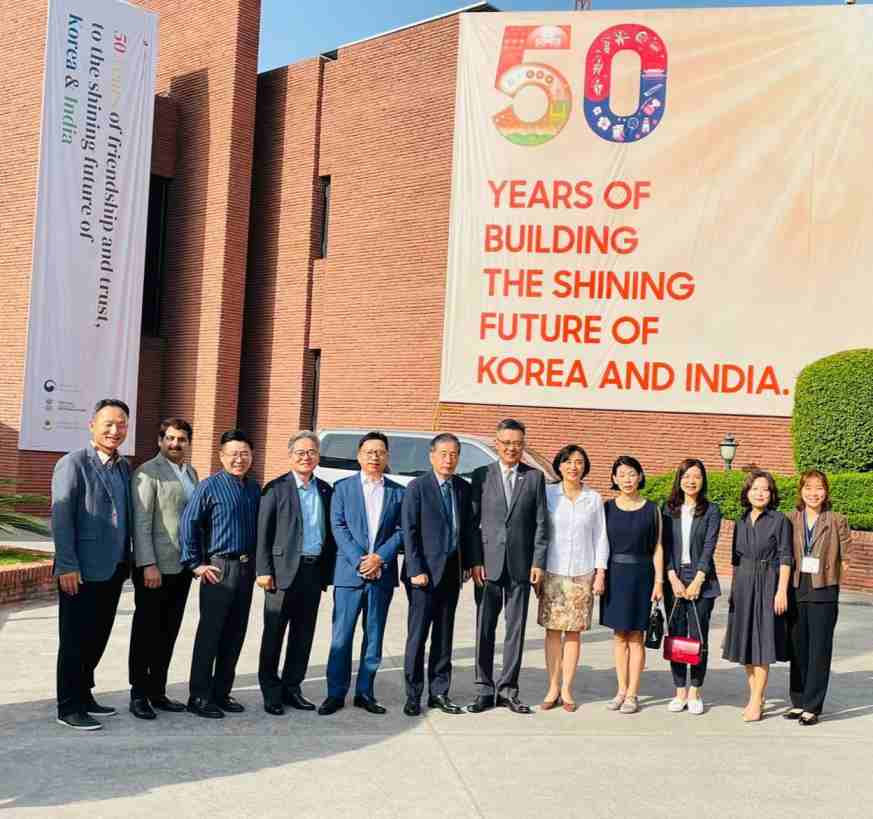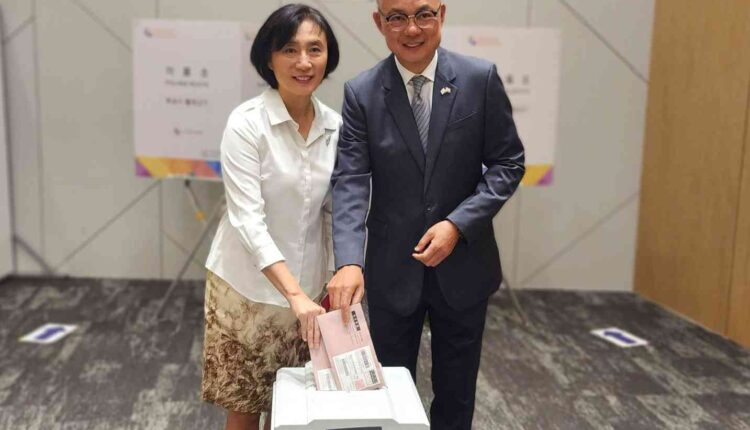Overseas Koreans cast vote at polling stations set up at embassy, consulates in India
22nd National Assembly Overseas Elections 제22대 국회의원 재외선거: (March 27-April 1): Overseas elections leave an important foundation for gathering the voices of overseas Koreans across the globe and developing national policies for them.
NEW DELHI: The electoral process for South Korea’s 22nd National Assembly Overseas Elections started on Wednesday morning at the Embassy of the Republic of Korea in Delhi as well as at consulates in Mumbai and Chennai. Korean community from Delhi, NCR towns, and from other north Indian cities i.e. Chandigarh and Dharamshala started reaching the embassy in New Delhi to cast their votes. The process will continue at the Embassy and other consulates till April 1, ahead of South Korea’s national assembly elections scheduled on April 10.
 On Wednesday morning, Chang Jae-bok, Ambassador of the Republic of Korea and his wife were the first to cast their vote at the polling station set up at the embassy in New Delhi. Then followed other community and associations leaders that included Park Euy Don, President of Federation of Korean Associations in India, and his wife, Park Seong Heum, President of KOSMA and his wife, and Lee GI, Chief Representative, South-West Asia, Peaceful Unification Council and his wife, KIM Jin Bum, President, Korean Youth Commerce Association in India, and others. The gates of the polling station were open for voting at 8.00am, and the process continued till 5.00pm.
On Wednesday morning, Chang Jae-bok, Ambassador of the Republic of Korea and his wife were the first to cast their vote at the polling station set up at the embassy in New Delhi. Then followed other community and associations leaders that included Park Euy Don, President of Federation of Korean Associations in India, and his wife, Park Seong Heum, President of KOSMA and his wife, and Lee GI, Chief Representative, South-West Asia, Peaceful Unification Council and his wife, KIM Jin Bum, President, Korean Youth Commerce Association in India, and others. The gates of the polling station were open for voting at 8.00am, and the process continued till 5.00pm.
Special refreshment, coffee, water etc arrangements were made at the polling station at the embassy for the voters visiting the venue to exercise their electoral right.
 Despite this being assembly election, the Korean nationals living in New Delhi, NCR towns and other parts of the country have exhibited a high amount of interest in the electoral process and have registered for casting their votes at a good percentage.
Despite this being assembly election, the Korean nationals living in New Delhi, NCR towns and other parts of the country have exhibited a high amount of interest in the electoral process and have registered for casting their votes at a good percentage.
Keeping in mind estimated 1.97 million overseas voters living and working across the globe in various countries and to secure their voting rights as well as to ensure their participation in the country’s electoral process, the National Election Commission of the Republic of Korea makes special arrangements through its respective embassies and consulates allowing these overseas Korean to cast their votes before the start of main electoral exercise in the Republic of Korea.
 South Korea’s national assembly elections will take place on 10 April with ruling People Power Party (PPP) and Democratic Party (DP) fielding their candidates. Current president Yoon Suk-yeol is from the PPP, although the DP currently holds the majority seat in the national assembly with 163 of the 297 seats.
South Korea’s national assembly elections will take place on 10 April with ruling People Power Party (PPP) and Democratic Party (DP) fielding their candidates. Current president Yoon Suk-yeol is from the PPP, although the DP currently holds the majority seat in the national assembly with 163 of the 297 seats.
Significance of Introducing the Overseas Voting System
As per the National Election Commission of the Republic of Korea, the realization of the people’s basic rights is guaranteed by the country’s constitution. Voting rights is the most basic and essential right to realize the principle of popular sovereignty and has a superior status over other basic rights, and restrictions on the right to vote should be kept to a minimum. Nevertheless, overseas Koreans have not been able to fully enjoy the rights they deserve as subjects of national sovereignty simply because they are outside the country.
 However, on June 28, 2007, the Constitutional Court ruled that the provisions of the Public Official Election Act were unconstitutional due to violations of the voting and equal rights of overseas Koreans (overseas residents) and violation of the principle of universal suffrage. This event served as a milestone in that it became possible for Koreans residing abroad to exercise their suffrage abroad.
However, on June 28, 2007, the Constitutional Court ruled that the provisions of the Public Official Election Act were unconstitutional due to violations of the voting and equal rights of overseas Koreans (overseas residents) and violation of the principle of universal suffrage. This event served as a milestone in that it became possible for Koreans residing abroad to exercise their suffrage abroad.
Rise of Status as a Democratic Nation
The introduction of the overseas voting system is historically significant in that it serves as a tool that measures that the country has entered a politically advanced country and is the completion of our country’s democracy.
According to the evaluation of The Economist, the British economic current affairs magazine, on the election process and election management, Korea is currently evaluated as one of the best in the world. The National Election Commission will successfully managed overseas elections by making full use of its experience in domestic election management.
Promoting the rights and interests of Koreans living abroad and inspiring pride and patriotism
With the introduction of the overseas voting system, overseas Koreans can exercise their right to vote, which means that their opinions will be reflected in national affairs. It also means more national policies for overseas Koreans will be introduced, which will further promote the rights and interests of overseas Koreans. In addition, by exercising your right to vote abroad, you will be able to feel patriotism and pride in being a citizen of the Republic of Korea no matter where you are in the world.
Active Response to the era of globalization
In the era of globalization, overseas elections will leave an important foundation for gathering the voices of overseas Koreans across the globe and developing national policies for them. Meanwhile, fair and clean overseas elections will enhance Korea’s national brand and establish a global Korean network, contributing to national harmony and development.


